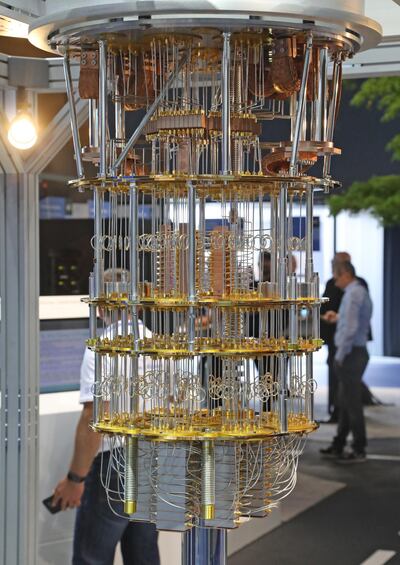Read also: Abu Dhabi unboxes the Middle East's first quantum supercomputer
Quantum computing is set to change our world.
The technology offers the prospect of huge breakthroughs in a number of fields, including science, finance and even our understanding of the way the universe works.
And Abu Dhabi is about to get in on the game.
The emirate is building its own quantum computer, the first in the UAE, which will be able to process information at much faster speeds than classic technology.
Although it is still early days, experts say the technology offers huge potential.
But how do quantum computers work? And what could they achieve?
The National explains.
What is the difference between traditional and quantum computers?
Today’s computers function using something called bits, which are arranged in a combination of ones and zeroes. A zero represents “off,” while “on” is a one.
Everything we see on a computer screen is made from a combination of these ones and zeroes.
But this binary system can be very limiting.
While the combinations can be used to reflect basic information and calculations, they cannot solve complicated problems.
Even the world’s largest supercomputer would eventually run out of space trying to choose the best solution to a problem with many options.
Quantum computers do not.
Instead of bits, they use quantum bits, or "qubits".
And using these qubits they are capable of solving calculations a traditional computer could never answer.
Although it is still very early days in terms of the field of quantum computing, this has already happened.
In late 2019, Google announced it had achieved "quantum supremacy".
This means that its quantum computer became the first to solve a calculation in less than four minutes that would have taken the world's most powerful supercomputer 10,000 years to complete.

How does it work?
By applying the principles of a branch of physics called quantum mechanics, where particles can exist in two states at once, there are endless possibilities.
A quantum computer doesn’t have to choose one rule, meaning the qubits can be in two states at the same time.
So instead of being either "on" or "off", the qubits can be on and off simultaneously. This is known as "superposition".
It helps allow quantum computers to process multiple possibilities at once, solving problems at a much faster rate.
Faced with a choice of thousands of routes, traditional computers would try each in turn, ruling them out one by one.
But a quantum computer can test them all at once, reducing a calculation that would ordinarily take years to minutes.
And by processing a lot more information faster, they can evaluate "many outcomes simultaneously, thereby increasing their calculating power exponentially," according to research from Princeton University, in the US.
But quantum computers are as fragile as they are complex.
They require an ultra-cold environment to operate of just above zero Kelvin – a unit of temperature which is minus 273.15°C the lowest physically possible temperature in the universe. That is colder than deep space.
This helps keep the environment stable, with less energy and therefore less chance of the qubits flipping between states.

What are the latest developments?
Quantum physicists at Abu Dhabi's Technology Innovation Institute have begun building the the quantum computer.
Two dilution refrigerators have arrived from Finland to keep the “brain” of the supercomputer - the one-by-one centimetre chip - cool enough to work.
The aluminium that will hold the quantum chip has been produced by Emirates Global Aluminium in Abu Dhabi.
What problems could quantum computing help solve one day?
The possibilities are endless.
Talia Gershon, senior manager of quantum experiences at IBM research, said because the computers calculate things in a different way, “we will be able to solve problems we wouldn’t be able to in any other way”.
That includes the mundane, such as finding the most efficient route, to huge breakthroughs in science, including creating new cancer treatments – or possibly even finding a curefor cancer.
They may even one day answer questions about the origins of the universe and address mysteries of space and time.
Chief strategist at Independent Software, Kevin Coleman foresees that "the disruptive potential of quantum technology will make the change of the Internet era look like a small bump in the road".
Quantum computers will also able to sort through reams of data on complicated subjects like climate change to predict how it will progress.
Once particularly useful future application, according to Harvard Business Review, will be the potential development of new drugs, a task it is "uniquely suited for" because it would operate on the same laws of quantum physics as the molecules it is simulating.
And so, Abu Dhabi has joined the community of nations endeavouring to accomplish this next step in human history.
The Advanced Technology Research Council is building the computer at its Quantum Research Centre labs in Abu Dhabi, in collaboration with Barcelona-based Qilimanjaro Quantum Tech.
"We are at the cusp of a new era with the advent of quantum computing," Faisal Al Bannai, secretary general of the Advanced Technology Research Council, told The National.
“We are proud to embark on building one of these wonderful machines."














